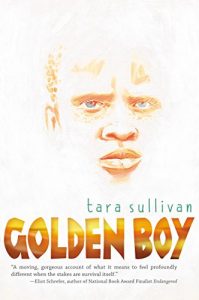“Harrowing but ultimately redemptive…the murder of Tanzania's albinos is a real and horrific phenomenon of the past 15 years, a cold fact that makes the fictional events in ‘Golden Boy’ more moving and consequential than those in any dystopian young-adult chase-drama.”
—The Wall Street Journal
*"A riveting snapshot of one Tanzanian boy who makes himself matter."
—Kirkus Reviews, starred review
*“Readers will be haunted by Habo’s voice as he seeks a place of dignity and respect in society. An important and affecting story.”
—School Library Journal, starred review
Thirteen-year-old Habo has always been different—light eyes, yellow hair and white skin. Not the good brown skin his family has and not the white skin of tourists. Habo is strange and alone. His father, unable to accept Habo, abandons the family; his mother can scarcely look at him. His brothers are cruel and the other children never invite him to play. Only his sister Asu loves him well. But even Asu can't take the sting away when the family is forced from their small Tanzanian village, and Habo knows he is to blame.
Seeking refuge in Mwanza, Habo and his family journey across the Serengeti. His aunt is glad to open her home until she sees Habo for the first time, and then she is only afraid. Suddenly, Habo has a new word for himself: Albino. But they hunt Albinos in Mwanza because Albino body parts are thought to bring good luck. And soon Habo is being hunted by a fearsome man with a machete. To survive, Habo must not only run, but find a way to love and accept himself.
—The Wall Street Journal
*"A riveting snapshot of one Tanzanian boy who makes himself matter."
—Kirkus Reviews, starred review
*“Readers will be haunted by Habo’s voice as he seeks a place of dignity and respect in society. An important and affecting story.”
—School Library Journal, starred review
Thirteen-year-old Habo has always been different—light eyes, yellow hair and white skin. Not the good brown skin his family has and not the white skin of tourists. Habo is strange and alone. His father, unable to accept Habo, abandons the family; his mother can scarcely look at him. His brothers are cruel and the other children never invite him to play. Only his sister Asu loves him well. But even Asu can't take the sting away when the family is forced from their small Tanzanian village, and Habo knows he is to blame.
Seeking refuge in Mwanza, Habo and his family journey across the Serengeti. His aunt is glad to open her home until she sees Habo for the first time, and then she is only afraid. Suddenly, Habo has a new word for himself: Albino. But they hunt Albinos in Mwanza because Albino body parts are thought to bring good luck. And soon Habo is being hunted by a fearsome man with a machete. To survive, Habo must not only run, but find a way to love and accept himself.






